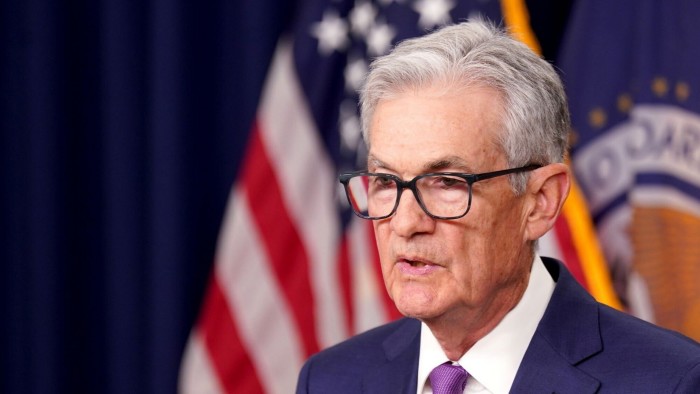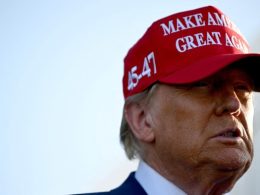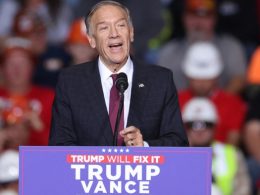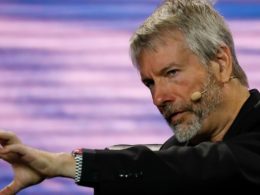This article is an on-site version of our FirstFT newsletter. Subscribers can sign up to our Asia, Europe/Africa or Americas edition to get the newsletter delivered every weekday morning. Explore all of our newsletters here
Today’s agenda: EY wins client despite German ban; BoE rate decision; US government faces shutdown; draw-it-yourself chart of the day; and the FT’s Person of the Year
Good morning. We start with the impact of the Federal Reserve’s announcement yesterday as it cut interest rates by a quarter of a percentage point. The US central bank signalled a slower pace of easing next year, scaling back the number of forecast rate cuts and raising inflation estimates.
The fallout: The dollar jumped to its highest level in two years against a basket of six currencies, while US stocks and government bond prices fell. The S&P 500 index closed down nearly 3 per cent and the tech-heavy Nasdaq Composite dropped 3.6 per cent. Shares in smaller publicly listed companies, considered particularly sensitive to fluctuations in the US economy, were badly hit, knocking the Russell 2000 down 4.4 per cent.
Why the more cautious outlook? Fed chair Jay Powell cited signs that progress on getting inflation down to the central bank’s 2 per cent target had stalled. He also acknowledged that some officials had begun to include assumptions about Donald Trump’s policies in their forecasts, a marked shift from his initial stance of avoiding speculation about what the next administration would do. Some economists fear that the president-elect’s plans for tariffs, mass deportations and tax cuts could lead to higher inflation, lower growth and more volatility, further complicating the Fed’s task of finding a “neutral” rate that neither slows nor accelerates growth.
Here’s more analysis of Powell’s remarks and analysts’ predictions for rate cuts in 2025.
-
Bank of Japan: The central bank has left interest rates unchanged at 0.25 per cent amid doubts over whether the country’s wage-driven inflation is sustainable.
-
M&A revival: Dealmakers are betting that a pick-up in megamergers will gather pace under Trump, after a rebound in larger deals helped push the value of takeovers back over the $3tn mark this year.
For the latest on the incoming Trump administration, sign up for our White House Watch newsletter. And here’s what else we’re keeping tabs on today:
-
War in Ukraine: Volodymyr Zelenskyy meets EU leaders in Brussels as the bloc’s chief diplomat warns western capitals to stop suggesting peace talks to the Ukrainian president. Vladimir Putin holds his annual press conference just days after one of his top generals was assassinated in Moscow.
-
Economic data: The US has updated third-quarter GDP figures, and GfK has its consumer climate survey for Germany.
-
UK interest rates: The Bank of England is expected to hold rates steady after official figures yesterday showed inflation rose to 2.6 per cent in November.
-
Companies: Accenture, ConAgra, FedEx and Nike report results, while Serco has a trading statement.
Five more top stories
1. EY has signed up its first new Dax-listed audit client since the collapse of payments group Wirecard despite a ban on winning auditing mandates from listed German companies. Qiagen, a biotech group listed in New York and Frankfurt, has hired the Big Four firm to be its new group auditor from January, highlighting the limitations of national audit regulation in Europe.
2. The US government could shut down within days after Donald Trump attacked a bipartisan funding deal struck between House Republicans and Democrats. Leading Republicans ditched the bill, which would have kept the federal government funded beyond tomorrow, after the president-elect called it a “foolish” and “inept” compromise.
3. Exclusive: UK defence spending needs to rise to 3.6 per cent of GDP if the country wants to modernise its military while protecting its nuclear deterrent and meeting Nato obligations, according to internal defence ministry calculations. The figure, a 56 per cent increase on current spending levels of 2.3 per cent, is widely regarded as a completely unrealistic request.
4. The US has stepped up its battle against Isis in Syria as it seeks to prevent the group exploiting a power vacuum after rebels toppled the Assad regime. In the past two weeks, US forces have struck more than 75 Isis targets during two waves of attacks targeting jihadi leaders and camps in the fractured Arab state. Here’s more on the flurry of military activity.
5. Economists are warning that China’s export growth could weaken or even contract next year as a result of Trump’s tariffs as the incoming US administration threatens to hamstring a crucial source of expansion for Beijing. Goldman Sachs expects Chinese exports to decline 0.9 per cent in dollar terms next year. Here’s where other banks and economists are putting their forecasts.
-
More US-China tensions: China has increased its arsenal of operational nuclear warheads to 600 from 500 in just a year, according to the Pentagon.
FT Person of the Year
The Financial Times made Donald Trump its “Person of the Year” in 2016, a month before his inauguration as US president. He would end his first term helping to goad a mob assault on Capitol Hill, and much of the world agreed at the time that he had been, in the words of Joe Biden, “an aberrant moment”. Then came the most dramatic comeback in modern US history. This year, the FT has again picked Trump because of his remarkable return to power. It is no longer possible to dismiss him as a blip.
We’re also reading and watching . . .
-
AI regulation: The outgoing head of the US Department of Homeland Security told the FT that Europe’s “adversarial” relationship with tech groups was hampering a global approach to regulation.
-
Guinness’s success: The Irish stout offers lessons for its parent Diageo: beware underestimating steady performers in favour of celebrity start-ups, writes John Gapper.
-
📺 Lars Windhorst: From scandals and spies to a superyacht, a man once dubbed the “German Bill Gates” gives his own account of how his ventures came crashing down in the latest FT film.
-
UK politics: Conservative shadow minister Andrew Griffith has urged Elon Musk to take another look at the Tories before donating to Reform UK.
DIY chart of the day
How well do you know the jobs market? Test your knowledge on trends such as hybrid schedules, the gender pay gap and AI hiring with the FT’s new “draw your own chart” game.
Take a break from the news
Pop critic Ludovic Hunter-Tilney looks back at this year’s best album releases, including Charli XCX’s summer hit Brat, Kim Gordon’s second solo outing The Collective and Ka’s “hypnotic” The Thief Next to Jesus.

Thank you for reading and remember you can add FirstFT to myFT. You can also elect to receive a FirstFT push notification every morning on the app. Send your recommendations and feedback to firstft@ft.com
Source link










